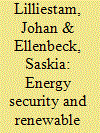|
|
|
Sort Order |
|
|
|
Items / Page
|
|
|
|
|
|
|
| Srl | Item |
| 1 |
ID:
177332


|
|
|
|
|
| Summary/Abstract |
Within flow-based market coupling, the EU's preferred method for calculating cross-border trading capacities, recent regulatory changes stipulate minimum trading capacities, so-called minRAMs which have to be provided to electricity markets. Effectively, high predicted flows on considered electricity grid elements have to be reduced to reserve a minimum of the elements' capacities for cross-zonal trading. This analysis investigates if the adjustments made to meet this criterion, in the form of augmented trading domains, lead to higher amounts of curative congestion management. To quantify the effect of increasing minRAMs on overall welfare, the markets and grids of Central Western Europe are analyzed during two representative weeks of 2016. The results show the increasing market coupling welfare is more than offset by rising congestion management costs, leading to net welfare losses. In the best case, the generation plus congestion management costs within Central Western Europe rise by 7.25% when increasing the minRAMs from the current 20%–45% and a minRAM of 70% is 6.28% more expensive compared to a minRAM of 20%. The analysis derives policy recommendations for implementing the minRAM stipulation, with a particular focus on a cost-minimizing selection of generation shift keys, in general as well as situation-dependent terms.
|
|
|
|
|
|
|
|
|
|
|
|
|
|
|
|
| 2 |
ID:
150788


|
|
|
|
|
| Summary/Abstract |
Power grid interconnection has gained attention in Northeast Asia (NEA) as a means to build an economically efficient power system and to effectively utilize renewable energy, such as wind and solar resources in the Gobi Desert and hydro resources in Eastern Russia.
|
|
|
|
|
|
|
|
|
|
|
|
|
|
|
|
| 3 |
ID:
103474


|
|
|
|
|
| Publication |
2011.
|
| Summary/Abstract |
Worldwide electricity sector reforms open up electricity markets and increase trades. This has environmental consequences as exports and imports either increase or decrease local production and consequently greenhouse gas (GHG) emissions. This paper's objective is to illustrate the importance of electricity trade's impact on GHG emissions by providing an estimate of the net GHG emissions resulting from these trades. To achieve this objective, Quebec hourly electricity exchanges with adjacent jurisdictions were examined over the 2006-2008 period. In order to associate a specific GHG emission quantity to electricity trades, hourly marginal electricity production technologies were identified and validated using the Ontario hourly output per power plant and information released in the Quebec adjacent system operator reports. It is estimated that over three years, imports into Quebec were responsible for 7.7 Mt of GHG, while Quebec hydropower exports avoided 28.3 Mt of GHG emissions. Hence, the net result is 20.6 Mt of avoided emissions over 2006-2008, or about 7 Mt per year, which corresponds to more than 8% of the Quebec yearly GHG emissions. When GHG emissions from all life cycle stages (resource extraction to end-of-life) are accounted for, the net avoided GHG emissions increase by 35%, to 27.9 Mt.
|
|
|
|
|
|
|
|
|
|
|
|
|
|
|
|
| 4 |
ID:
105756


|
|
|
|
|
| Publication |
2011.
|
| Summary/Abstract |
Solar power imports to Europe from the deserts of North Africa, as foreseen in the Desertec concept, is one possible way to help decarbonising the European power sector by 2050. However, this approach raises questions of threats to European energy security in such an import scenario, particularly in the light of increasing import dependency and Russia's use of the "energy weapon" in recent years. In this paper we investigate the threat of North African countries using the Desertec electricity exports as an "energy weapon". We develop and use a new model to assess the interdependence - the bargaining power symmetry, operationalised as costs - of a disruption in a future renewable electricity trade between North Africa and Europe. If Europe maintains current capacity buffers, some demand-response capability and does not import much more than what is described in the Desertec scenario, it is susceptible to extortion and political pressure only if all five exporter countries unite in using the energy weapon. Europe is not vulnerable to extortion by an export cut from only one country, as the European capacity buffers are sufficient to restore the power supply: no single exporter country would have sustained bargaining power over Europe.
|
|
|
|
|
|
|
|
|
|
|
|
|
|
|
|
| 5 |
ID:
094302


|
|
|
|
|
| Publication |
2010.
|
| Summary/Abstract |
Electricity trade across regions is often considered welfare enhancing. We show in this paper that this should be reconsidered if environmental externalities are taken into account. We consider two cases where trade is beneficial, before accounting for environmental damages: first, when two regions with the same technology display some demand heterogeneity; second when one region endowed with hydropower arbitrages with its "thermal" neighbor. Our results show that under reasonable demand and supply elasticities, trade comes with an additional environmental cost. This calls for integrating environmental externalities into market reforms when redesigning the electricity sector. Two North American applications illustrate our results: trade between Pennsylvania and New York, and trade between hydro-rich Quebec and New York.
|
|
|
|
|
|
|
|
|
|
|
|
|
|
|
|
| 6 |
ID:
191114


|
|
|
|
|
| Summary/Abstract |
This paper reviews progress towards the establishment of an Association of Southeast Asian Nations (ASEAN) Power Grid (APG) and the key barriers to multilateral cross-border electricity trade in ASEAN. An analysis across political, technical, institutional, economic, environmental, social and time dimensions is employed. Using a policy sequencing framework, the paper concludes it remains premature for ASEAN to pursue a strong form of power sector market integration on account of the sizeable barriers that currently remain, especially economic and institutional barriers. Focusing on bilateral power purchase agreements and large-scale investments in solar and wind power over 2022–2030 would help to develop stronger foundations for ASEAN to make steps towards deeper regional integration in the electricity sector in subsequent years, while also being consistent with renewables adoption goals.
|
|
|
|
|
|
|
|
|
|
|
|
|
|
|
|
| 7 |
ID:
150348


|
|
|
|
|
| Summary/Abstract |
This paper focuses on how to promote regional cooperation in electricity. We begin by discussing the theory of international trade cooperation in electricity, with a view to discussing what preconditions might be important in facilitating wide area trading across national borders.
We then develop lessons based on the comparison of four case studies. These include three regional developing country power pools – the Southern African Power pool (SAPP), West African Power pool (WAPP) and the Central American Power Market (MER). We contrast these with Northern Europe's Nord Pool. These cases highlight both the potential and difficulty of having cross-jurisdictional power pools.
In the light of the theory and evidence we present, we draw key lessons in the areas of: preconditions for trading; necessary institutional arrangements; practicalities of timetabling; reasons to be hopeful about future prospects.
|
|
|
|
|
|
|
|
|
|
|
|
|
|
|
|
|
|
|
|
|